Q&A with Martin Wolf: the U.S. protectionism, China's structural challenge, and the EU's quest for strategic autonomy
Chief Economics Commentator at the Financial Times engages with CCG on a comprehensive span of topics from global trade, artificial intelligence, to geopolitics.
Hi, this is Yuxuan from Beijing. On February 22, the Center for China & Globalization (CCG) hosted the latest of its Global Dialogue series with Martin Wolf, Chief Economics Commentator at the Financial Times. The event was broadcast the next day February 23 in English and Chinese on social media channels in China. Both recorded versions are also available on the Chinese internet.
Previously, the CCG Update published the lecture delivered by Wolf, which elucidates the new era of global trade post-hyperglobalization. Today's newsletter will feature the second part of the event, which included a dialogue and Q&A session with CCG President Henry Huiyao Wang, former Director-General at the Ministry of Commerce Sun Yong, and several Chinese journalists.
Wolf underscores the unambiguous gains from trade, addressing the challenges Western companies face in China, ranging from joint venture complications to intellectual property issues. He also highlights the political ramifications of trade's uneven benefits, referencing Trump's administration as an example of how politics can disrupt established trade norms and rational policy-making in the face of globalization challenges.
Wolf expresses skepticism about the future impact of AI. He differentiates between the potential effects on the trading of goods, which he suspects might remain relatively unaffected, and the trading of services, information, and data flows, where he anticipates more significant changes due to AI advancements.
Wolf addresses China's economic transition challenges, focusing on two key issues: the need to boost productivity amidst dwindling total factor productivity growth, and managing an overinvestment problem against a backdrop of high national savings. The diminishing returns from historically high investment rates, particularly in real estate, signal the urgency for new productive investment avenues. Also, Wolf warns that China faces similar risks to Japan in the 1990s if it doesn't address its macroeconomic imbalances, particularly its excessive national savings rate and reliance on real estate investment for growth.
Wolf argues that strategic autonomy for the EU is an unlikely goal unless external forces, particularly the United States, compel it. Such autonomy would require a radical transformation of the EU into a more state-like entity, and central to this transformation would be the development of a substantial nuclear arsenal to counter Russia. Wolf also cautions that moving towards strategic autonomy would likely lead to a geopolitical landscape dominated by Germany, which he regards as a failed empire.
Henry Huiyao Wang
Great! thank you, Martin, for your outline of the thinking on this issue. I just have one more question before I open our roundtable. In your article at FT, "What we really know about the global economy", you outline demographic changes, climate changes, and of course, technological advancement, the spread and the communication of global technology, and of course, the growth itself, information exposure, and things like that.
But as we know, people are talking about de-risking China and things like that. I just came back from the Munich Security Conference and this year's theme was "Lose-Lose?" You know, if we continue that, we will end up with "lose-lose." I mean, China used to say "win-win," if we can't achieve a win-win, we end up in a "lose-lose." Also, I was invited to speak at the German Parliament in November where Von der Leyen was speaking. And I heard the CEO of Mercedes Benz talking. He was talking about de-risking: The biggest risk is not going to China.
Then, you know, China now has 70% of global 5G, two-thirds of global high-speed railway. And out of the ten largest container ports, seven of them are in China. The success of Apple is because they relocated 95 percent of Apple produced in China and then they gave the contract of the chips to the Taiwanese company which President Trump complained about. But that's the synergy.
So one of the factors of globalization is the synergy, the effectiveness where you have 12 million single-child college graduates every year - an abundance of talent supplies. So out of those factors, even though the labor cost is rising, the synergy and the efficiency upstream and downstream (still exist). I think some German companies said the reason they are in China, for example, the car industry, is because here's the state-of-the-art technology of the upstream, downstream, and R&D. If they can't have entry to the Chinese market they cannot enter anywhere else. They have to be here to conquer the China market in order to conquer a world market.
So in that sense, this super productivity that China is able to generate would be one of the factors that in the future, it's very difficult to decouple or de-risk from China because that's where the largest application of the digital apps and also the big market potential. As Premier Li said at Davos, for this decade, there are 400 million [people in the middle-income bracket]; next decade it would be 800 million. So would this be too difficult for them to neglect? Does David Ricardo's competitive advantage still work for the efficiency, synergy, and productivity of the 1.4 billion people market? So that would be my last question. Thank you.
Martin Wolf
Well, there are clearly unambiguous gains from trade which arise from - I haven't talked about - many sources, including the ones you discuss, so I don't think there's any particular reason to dispute this. The importance of the Chinese market for producers and companies varies across industries and across countries. If you look at particularly, say, automobile manufacturers, and if you're German, you'd want to operate globally. The German market isn't big enough, so you need the European market and they want as much as possible of the rest of the world's market. So the German companies, like that, have been actively engaged here from the beginning. And on the whole, they've done very well.
The experience of Western companies in China has, to be honest – I've talked of - vary very much across the companies and the industries. And the experience they've had is complicated by Chinese practices, by the nature of the joint ventures they were in and what happened to their intellectual property, and so forth. They're very variable. But there's no doubt a number of very, very important positive stories there. So that's absolutely clear.
On the other hand, there are very major Western companies in the text space, for instance, Facebook, which as far as I think, is basically not here and they've survived pretty well too, because the rest of the world's market is also very, very large. So it's not easy to argue that they all have to be here, but some of them clearly benefit enormously from it. But this is not everything here. I'm just trying to explain why the difficulties arise.
Trade is win-win in aggregate. It's not win-win for every country and for every group within countries at all times. Sometimes, depending on the comparative advantage of the country or the company or the groups within society, there can be a lot of losers. And losers are always more politically effective than winners. And it's an old proposition. The great Mancur Olson explained this best in his famous book The Logic of Collective Action, written 60 years ago - a wonderful man, I knew him very well.
Anyway, so up to now the general view in advanced European industry has been, "We benefit enormously from trade with China. It provides a wonderful market and a wonderful place to invest. But it's not a competitive threat to us." And that's still the view of many industries. The pharmaceutical industry doesn't see this as a threat. I think most of the tech industry thinks we can survive with China. That's all right. They're wonderful at some things. But as you say, the Apple relationship with China is mutually supportive. The chemical industry is not really worried about China's great market, but Chinese producers are not going to replace them.
But there are some cases: civil aviation. At the moment, Airbus looks fine. Boeing is collapsing. It's going to take over the world. It's not worried about China, (although) there are Chinese competitors. But there are some industries that are beginning to be worried. And the most important of them is the motor vehicle industry and not Mercedes because Mercedes is doing something different. But more BMW, which is we're in the middle of a technological revolution. The technological revolution will change the motor vehicle industry properly forever, and China is the leader.
So they're only going to wake up and find the strongest single industry in Europe is dead. That won't go easily. As somebody pointed out to me, it employs 14 million people, which is a lot in Europe, and they will all have political stakes.
So the answer to you is yes. In aggregate, you're right. On the whole, you are right. But there can be some very big difficulties. And the WTO even allows for this because you have safeguard clauses and they will be used. And one just has to be aware of these realities – something that is win-win in aggregate across everything is not necessarily win-win for everybody. And in a system in which everybody has political representation, that matters.
And all of this leaves aside the possibility that people go so crazy that they elect a nincompoop like Trump. And then we are in a different world. Now, I don't think that's going to happen in Europe. A similar figure. Marine Le Pen in France maybe, but she's not going to matter that much - I think. But of course, politics, as I said, quite apart these rational reasons, can lead to profound disruption if people basically abandon reasonable policy-making and start doing things that are really silly. And it seems to me, if you look at the reform and opening up process and its success, and you contrast it with what happened in the 20 years earlier, you can see people can make mistakes.
Hou Wuting, Caixin Global
Mr. Wolf, I'm a journalist from Caixin Media. Thank you for making the speech. I have two questions.
In the speech, you mentioned that after 2008 we've seen less economic opportunities, for example with less Chinese labor force. And then also we've exhausted the other driver that you mentioned: communication and transport. And you said that we haven't seen any great breakthrough. And last year we saw a lot of talks surrounding the topic of AI. So my question is: How do you see AI fits into these three drivers and what impact will be brought to globalization in terms of trade?
My second question is about the election in the UK that is happening this year. The opinion poll of Rishi Sunak has been quite disastrous and I want to ask you if the Labor can potentially win the election this year. What does it mean for the relations between the UK and China? And what are the sentiments in the UK at the moment? Thank you very much.
Martin Wolf
I think the honest answer to AI and trade is – I talked to people about it – I don't know. Because it depends on two things, both of which are unknowable. First, how profound of the change caused by AI going to be on society and economies is; and then more specifically from that, what will happen to trade. I can't see that. I may be wrong, but I can't see why AI which will clearly change a lot should have any particular powerful effect, at least on trading goods. It might have more significant effects on trade in information, cross-border information, the quality of information, data flows, the management of those, and digitally enabled services. More broadly, the implications might be quite profound, but I don't think I haven't read or seen anything or talked to anybody who says they really have a clear idea of what this will mean. And I think the main reason for that is we don't really know what it will mean anyway. I mean my own view. I have a very simple view of this, but that probably reflects my age.
It's an unspeakably bad idea and it's going to ruin everything. But I cannot see any gains. No, I'm fibbing. I can see a few gains from basically convincing human beings. We're no longer masters of our own intellectual fate. This is a pretty big thing. That's the real issue. Everything else is secondary.
However, my friends in DeepMind, which is part of Google, which is quite a big company in this business, will tell me that it can multiply massively our capacity of scientific advance and that's quite a big deal. So I accept that. But this is a general purpose. Technology and general-purpose technologies, when they come along and cause changes, are very difficult to predict.
On the election in Britain. I don't think the election in Britain will make any significant changes that I can see on policy towards China. I don't think we really have a policy towards China. Our policy towards China is determined by our relations with the U.S. and Europe, so we're not going to have a different policy in any fundamental way from either. Real problems arise when the policies towards China of the U.S. and Europe diverge, but at the moment, I would say they're not very divergent, except that Europeans are much weaker. Europeans are not very assertive. And since we have experts on Europe here, I probably don't need to explain why. I can give you the history of the last 200 years and it will explain why Europe is not the United States. But it will not diverge dramatically unless the Western alliance collapses. And the Western alliance is not really an alliance. Of course, it's an underlying guarantee from the U.S.
And that also addresses the question which one of you addressed, which is: Are there circumstances in which Europe will significantly diverge from the United States? And the answer is very simple. Only if the United States basically abandons Europe, which might happen now – it's possible – then we are in a different world, really different world. It would change the world of the last 80 years.
So about Britain's government. Look, I'm a Democrat, and basically, I'm a Democrat for a very, very simple reason, which will be very provocative, I understand. So forget what I'm going to say. Most leaders of most countries at all times are incompetent if you study history. I want to get rid of incompetent leaders without having to kill anybody. That's a very important objective to my mind. And in the last three years, we have managed to get rid of two sensationally incompetent leaders without having to kill them and that's a good thing. They went and nobody needs to think about them anymore and we are about to get rid of a third. And I think it is possible that the fourth will be less stupid than these people were. And that's progress.
Xie Wenting, Global Times
Thanks for your speech on globalization and the global economy, but my question is related to the Chinese economy. As we know, China is thinking about new drivers for its economic growth, as real estate and foreign trade, as you mentioned, are playing a diminishing role. What do you think are the potential new drivers for China's economic growth? This is my first question.
Second, we say that the Chinese GDP is kind of slowing down and our economy is facing some challenges. So from your point of view, what are the challenges for China's economy this year and what are your suggestions for Chinese policymakers? Thank you.
Martin Wolf
Well, I've had a great pleasure apart from giving lectures and all this myself and my second lecture was all about your first question and it was an hour long. I'm not going to give you the hour-long lecture and the discussions I've had with Chinese economists. These are pretty good questions, I think, and I must say that I have been surprised from the discussions I've had with economists, some of whom I've known for decades, that they are quite downbeat at the moment.
So let me separate the short-term with the long-term one. So my argument in my main lecture is just one I've been putting forward for a very long time, and is pretty standard: China has two macroeconomic problems. If you talk about the question of how will China become an all-round high-income country which is obviously the objective at the moment, China's GDP per head in real terms is roughly 30 percent of U.S. levels - higher, obviously, related to, say, Japan. And one would say that when it's 60 percent of U.S. levels, it's a high-income country. So that's clearly doable, but it's going to be harder than what's happened so far.
The first challenge is raising underlying productivity, and there's quite a lot of evidence from the data which suggests the total factor productivity, which is a measure of the rising output relative to the inputs, has not been growing very fast for quite a long time.
Growth has been very, very dependent on enormously high investment rates, but that's been slowing too. And the main reason I think, very clearly, is that the margin returns on investment have fallen a lot.
So there's a productivity problem and I think there's an overinvestment problem, which is another way of saying, in my view, that China's national savings rate is too high to be productively absorbed in the economy at current levels of GDP and there is no plausible investment - with one exception - which can offset that. And the last one - I think you mentioned - that did absorb a lot of these savings was this huge real estate building boom, but that's pretty clearly coming to an end. And the great thing about real estate is you can spend so much that it absorbs a lot of the savings.
Now if you think about this combination of things very broadly, there are the following things you can do. You can find new domestic investments in very large scale, which will absorb resources, savings, and be efficient and productive. And it seems to me the most plausible large-scale investments which are already happening is in renewable energies of various kinds. And that's clearly part of it. Though in commercial terms, it's not going to be terribly productive. It's profitable - it's defensive, more than profitable. Even so, I think it's going to be virtually impossible to absorb it in renewable investment.
The temptation in China, as far as I can see, is to increase investment in manufacturing. And the problem with that is it's going to create more excess capacity and a lot of that excess capacity will end up in exporting obviously to the world. And if it goes to Europe and the U.S., there's going to be resistance. It'll be very fierce resistance. So I think that will turn out not to work. It will be a waste.
Of course, investing in new technologies for Chinese markets is a different matter altogether. And some other developing markets, but most other developing markets aren't that big. So there's a limit there.
So investment is part of the story. But the bigger part of the story is China's national savings rate, which is the highest in the history of the world for a country at this level of development and size comparably, is just higher than can be absorbed productively at this current rate of income. And it's going to have to default.
The last really large way of absorbing the excess investment in real estate has sort of come to an end. Also in infrastructure and much of that's being built. That means consumption has to rise and the drivers will be consumption. I promise you the drivers will be consumption because that's what they've been for every country that got to the sort of level of GDP per head that China has now. And the question is only how it's done. It could be public consumption, it could be private household consumption. But if it's going to be public consumption, it means taxing. And if it's going to be private consumption, it means some combination of lower household savings and redistribution of income. And all that's going to be fantastically difficult.
So I think intellectually, one can see what the drivers will be, but how it's going to happen, I don't know. But these are what will turn out to be the drivers. If that doesn't happen, the growth will slow further. And already, growth has already slowed a lot.
I tend to the view that in China – I'm afraid controversially – the year-on-year GDP figures don't tell you very much. They don't tell you nothing - that's clear. And the problem is not that they're mismeasured, but that a lot of GDP is done and produced for non-commercial reasons. And if it's done for non-commercial reasons, you don't know what value it has. So if you build, for instance, vast numbers of tower blocks which are not occupied, that's not productive GDP. So this is the issue now.
That's to the second point about GDP this year or the GDP prospects. I tend to the view that whatever the Chinese government says the target is, it's what's going to happen. But the question is: What does it mean? Is this good valuable GDP, by which I mean GDP that produces now or in future welfare for the Chinese people, or the GDP which consists of creating stuff which will actually never be useable and that's really difficult to tell. Obviously, a lot of it has been the latter and there's no doubt that China has got much better off - there's no doubt. But quite a bit of it has also been the former and that is always the question. And I mean, I'm not the only person who said this. The former Premier said this, so this shouldn't be very controversial.
I talked to a lot of Chinese economists. Intelligent people, it seems to me, think that underlying trend growth is now about 4%. Let's assume that's correct. I can say with absolute confidence – almost very few things you can say in development economics – you cannot invest productively 40% of GDP when your economy is growing at 4%. It just means, by definition, you're investing too much, which is completely different from the case where you invest 40% of GDP in your economy is growing 10%. Then you need all this stuff because you have to expand the capital stock so much to meet the future demand. But the difference between 4% and 10% is a very big deal in terms of the expansion of the market and the new opportunities. So 40 percent investment rates won't work and they will have to fall, and one way or the other they will fall.
Sun Yongfu, CCG senior fellow; former Director-General of the Department of European Affairs, Ministry of Commerce
It seems to me that the geopolitical tensions have a lot to do with the trade tensions. And, as you mentioned, there are a lot of pressures. If Trump is coming again, the trade tension will be even more serious. Of course, business is business.
(Martin Wolf: I'm not at all sure Trump will be the next president. Do not take that for granted.)
Okay. I mean that the trade tension is there, and it will be there for quite a long time because China is more or less a rival for the United States. And in the long term, it's not Russia. Russia is a short-term enemy, but China is a long-term enemy. With this in mind, it's difficult for China - whatever you do - to create a kind of harmonious society or world because you need two to tango. And if the other side is not very happy to cooperate with you in the world, it's difficult for China to overcome this tension.
And the problem is: they have their allies and I think President Biden is doing quite successfully in having those allies together with them – and the EU is one of the examples and they just follow the suit of what the United States is doing to China.
What's your idea about how to achieve the so-called strategic autonomy? I think that could be good for China and the world. Can they really achieve that economically, politically, and militarily? It seems quite difficult. What's your idea about that? Thank you.
Martin Wolf
I think that's a relatively simple one to answer. The EU will never achieve strategic autonomy. It can have it thrust upon it. That's a very different thing. The U.S. can force it by abandoning it. And it is conceivable that the U.S. will be that stupid. It would be a monstrous mistake on the part of the U.S. But of course, if the U.S. really convinces the Europeans that they are on their own, then they have to exert strategic autonomy, or they find some other patron. It won't be China. But if the U.S. doesn't force it upon the Europeans, they will certainly not achieve it.
You've worked in Europe for many years. I and my ancestors have lived there forever, at least of the last 2,000 years. And we've lived in many countries because I'm Jewish and my ancestors come from many different countries. So I really know Europe and the Europeans don't want strategic autonomy. They cannot create effective political structures which would allow them to agree on how to implement it. As things are, they are far happier with subcontracting strategic autonomy to the provider of their umbrella. And I don't see any sign of this changing unless you generate a crisis so monstrous that the Europeans will have to integrate politically, because that's what will be required. You cannot do it with the current EU. You would have to create something that looked much more like a state. A structure like the EU cannot have strategic autonomy. It has to become more like a country with a government, and then it would need an army and it would need a lot of nuclear weapons, thousands of them.
Our principal enemy is Russia. Russia has only one instrument, 5,000 nuclear warheads. We are nobody without that. That's why the U.S. matters. Be serious about this - we can't have strategic autonomy without nuclear warheads if the U.S. doesn't defend us. Maybe 500 warheads would do. Of course, they could build them. But that's a different Europe. It's a different world, unimaginable. And I honestly don't think you'd like it because it would be German-led. Germany's record as a great power is not entirely happy. But once that happens, the Europe that will emerge would be quite unpredictable. It wouldn't be today's Europe.
And the other point I would make. I know a lot of Chinese people hope that Europe will somehow separate itself from America. But it won't because it doesn't want to be a power. There's a very profound desire not to be a power, and that's partly because of disagreements, profound disagreements. For sure, you know, the values, history, politics within Europe.
And the more important point I made which is already in my first lecture: Europe, the matters, is essentially an aggregation of failed imperial powers, which includes Germany. It didn't even get there. But my God, it tried to be an imperial power! It tried to centralize Europe. None of these countries view this experience with pleasure. They don't want to do this again, and that's what we're talking about.
So it is not going to happen. Europe will never be a good ally for China. It can be a good friend commercially; but in geopolitics, when it gets the rubber hits the road, as people say, it's going to go with America as long as America continues to be the guarantor of its security. Of course, the U.S. behaves in an unpredictable, unpleasant, self-centered, irrational way. But from our point of view, it's the least bad. It's the worst hegemon except all the others that are around. So that's why we stick with them.
Bai Yunyi, from Global Times
Some viewpoints suggest that the current performance of the Chinese economy is similar to that of Japan in the 1990s. So my question is: How do you view this comparison? What are the similarities and differences between China today and Japan back then? And do you think there are any lessons that China can learn from Japan's experiences?
Martin Wolf
Yeah, that was the subject of my second lecture and the answer is: similarities and differences.
So the difference, which is very important, is that China is, relatively speaking, much further from high-income status than Japan was in 1990. So its growth potential is substantially greater. And so there's much less reason for the productivity slowdown that occurred in Japan. So in that sense, with the right policies, China should not end up like Japan. That's the difference. It's a very important difference. The right policies should be possible. So this is my simple story of the last 30 years.
The similarities are that. So China has been like Japan, but even more so for all the East Asian countries. But Japan was the closest. You have very high savings since I've told you, peaking at 50% of GDP roughly. Japan had it peaked at about 40%. And this is fantastically good when you're growing at 10% because that's the sort of investment rate you want. In fact, without an investment rate of 35 to 40% of GDP, you cannot grow at 10%. So for a fast-growing manufacturing country reconstructing a modern economy from scratch, that savings rate is wonderful.
Now in the case of Japan that continued basically to the 1970s when it already became a high-income country – it caught up with most of Europe – but its saving was about 35 percent of GDP and natural investment rates, the investment rates that were growth-promoting, were falling. So as that happened in the 1980s and you will now begin to see the similarities. If you look at the long period, the investment rate declined and the current account surplus exploded. Because if you don't invest your savings at home with your investment, you invest them abroad, and investing abroad means you're running a current account surplus by definition. And the Americans saw this current account surplus which peaked at about 5% of GDP and said "No, we're not going to have that. It creates problems for us." And so they told the Japanese to get rid of it and the Japanese didn't do the sensible thing of lowering savings. They decided to expand domestic investment. And what do you think they did? They cut interest like crazy. They expanded credit like crazy. And they had one of the biggest property booms in the history of the world until China did. And that peaked in 1990 with the property boom which was a huge stock market boom, because money was free. And that ended up with what they call the bubble economy. And that collapsed in 1990.
And that's the similarity. Think of the Chinese current account surplus of ten percent of GDP in 2008. This disappeared and the savings rate didn't fall. So the offset was a massive rise in domestic investment as the growth was falling and that was in real estate and infrastructure. So those are the similarities in macro level except China did it on a much bigger level. When the thing collapsed, the Japanese policymakers said, "You've all been very bad people and very irresponsible, so we're not going to lower rates very much. We're not going to do any artificial stimulation. We're just going to allow the economy to adjust." What that delivered was deflation, entrenched deflationary expectations, which meant monetary policy ceased to be effective and a huge financial crisis which chewed up the 1990s. And because they've got deflation, monetary policy ceased to be effective. The deflationary process continued the whole of 2000s to still actually now.
And the terrible mistake was not to change their macro structure early in the 1990s and this is not hindsight. It's what I wrote then. It was obvious. So my view is the lesson from this experience: you've got terrific potential; do not allow deflation to set in. It's very important not to let it because then you will get falling prices; if you've got expectations of falling prices, monetary policy becomes very ineffective. You are then forced to use fiscal policies massively, which is very expensive and start dealing with your structural problems which are related to excess savings and consumption because the economy structure was wonderful for the 10%-growth years and it isn't anymore.
And nobody's tried to change it. It could be done. It's not difficult. And I think the mistake that I fear here is they won't do this on a big enough scale. And 10 years from now we will look back and we will say, actually, growth is now bound to three percent in the 30s.
Deflation is entrenched, monetary policy is ineffective, and China is not taking advantage of the opportunities it has. So that seems to me the lesson from Japan if the bubble bursts, if stock markets are weak and real estate prices are falling and there is lots of bad debt in the system which is getting worse, you have to clean up quickly, stop the deflation quickly, and you have to get consumption up and that can be done in many different ways. Otherwise, you could get caught in a trap. How likely is that? I don't know. It's certainly not certain. But my sense of this, very strongly, is the chances of this happening are quite significant.
If that is right - that’s why I said at the beginning - today is a moment in Chinese economic history that may be quite important for the next 10 or 20 years. The real estate solution to the problem of excess savings is no longer workable and there isn't much else that really works. When the economy is growing at 4 or 5%, you need to reduce the national savings rate. The national savings rate of 40 percent of GDP is just too much now. So, as I like to say when you say people should consume, no, I'm just saying that people should go out and enjoy their lives. What's wrong with that?

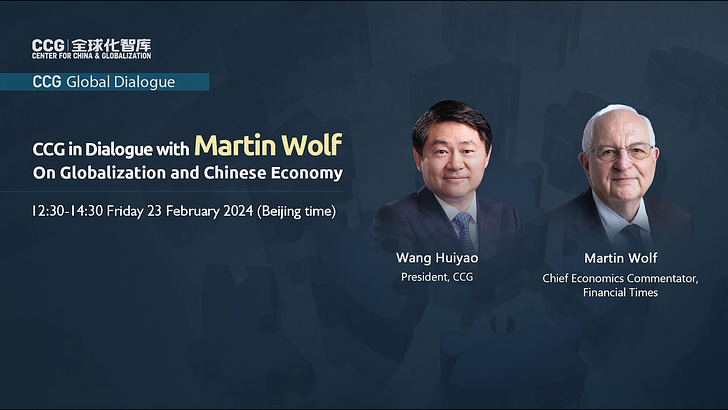



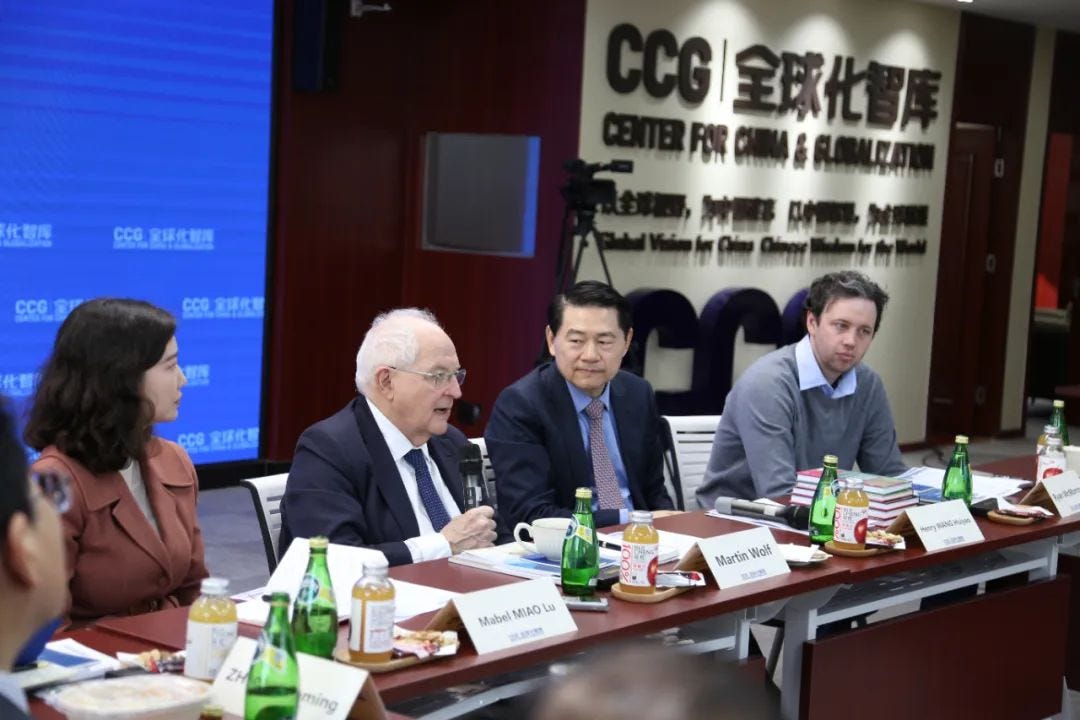
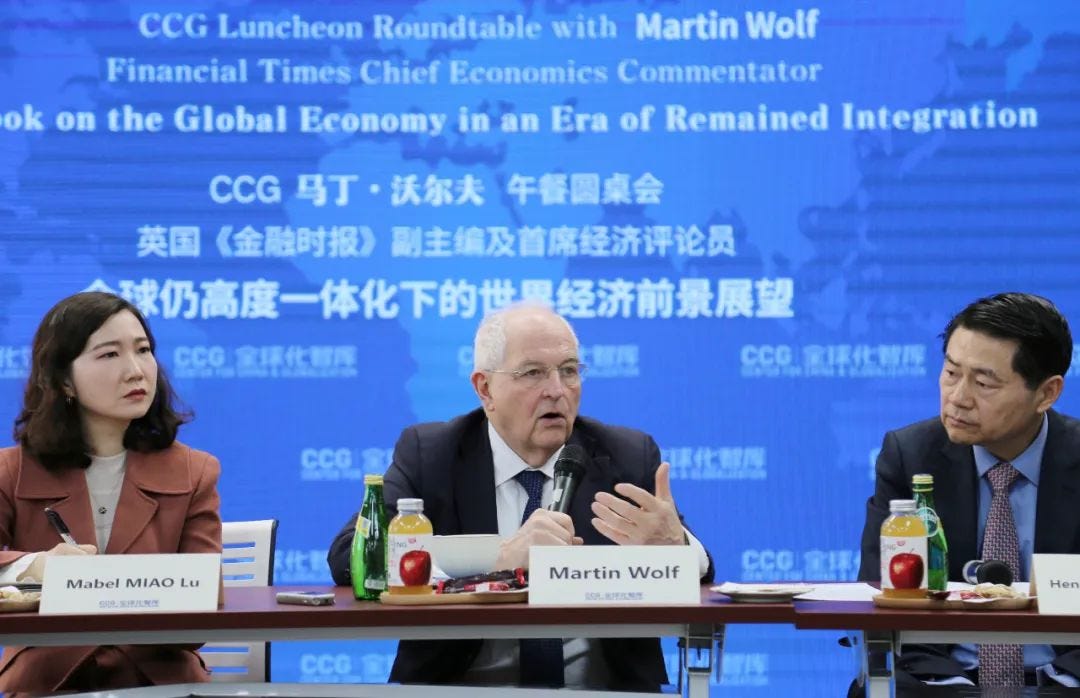
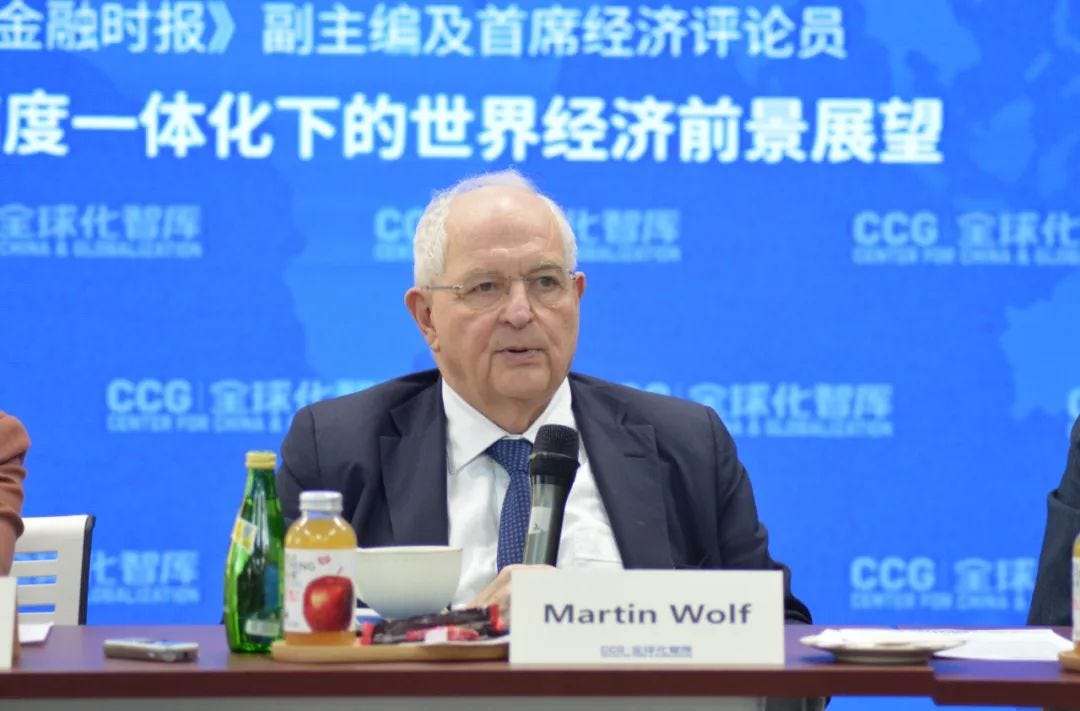
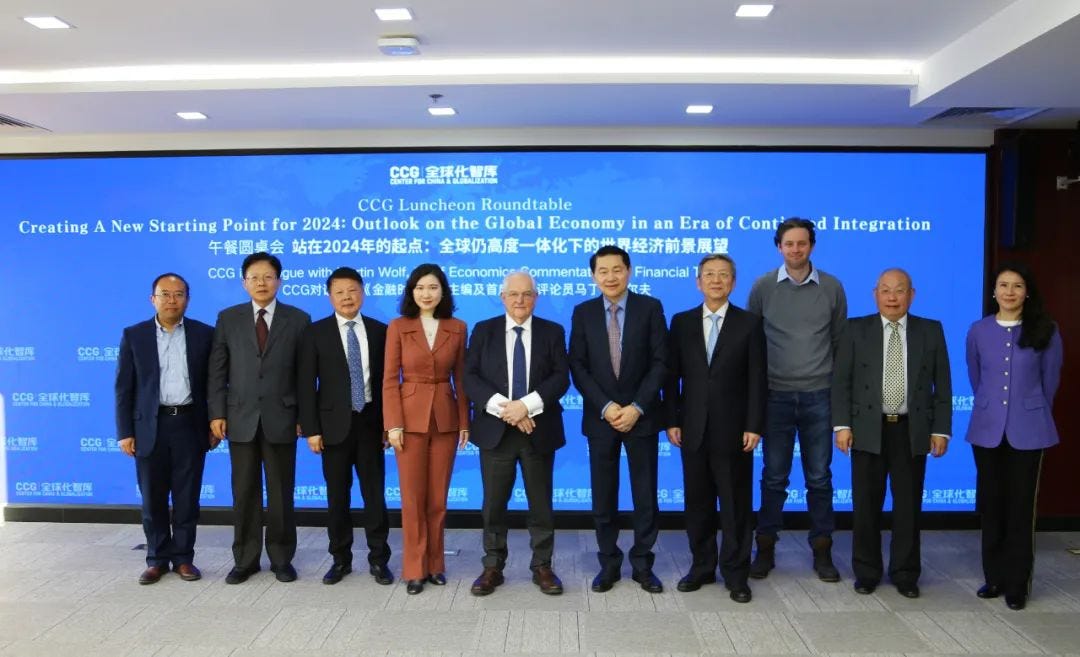
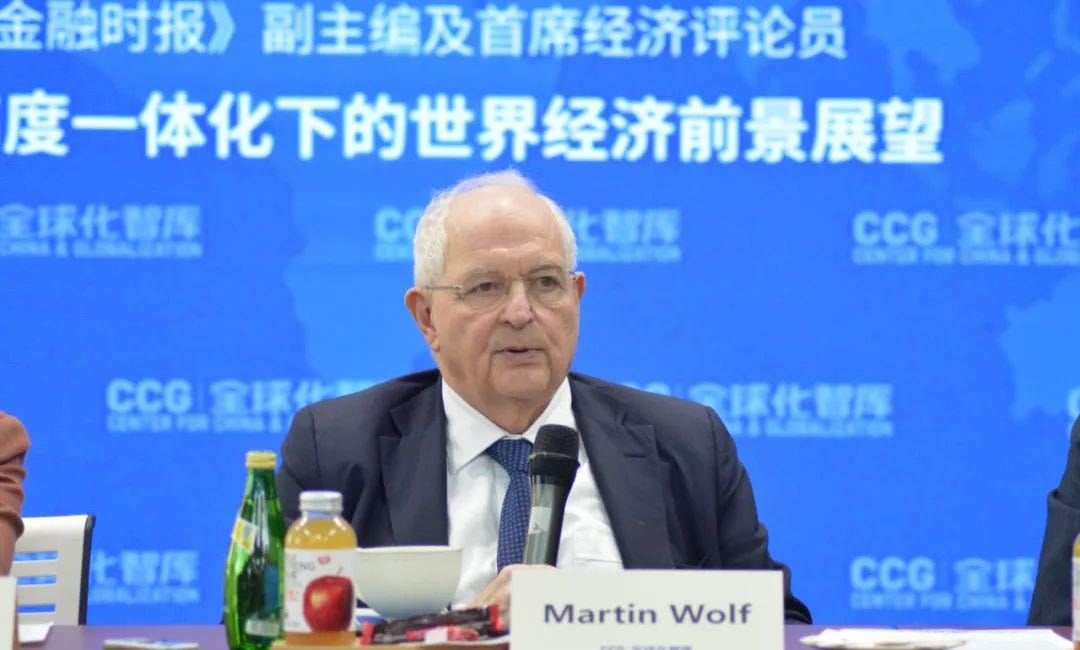


Martin Wolf, like most FT writers for the past 40 years, gets most things wrong on China:
1. "China's GDP per head in real terms is roughly 30 percent of U.S. levels”??
Adjusted for PPP it's 50% and gaining by 5% every year, with a QOL higher than America's..
2. "The first challenge is raising underlying productivity"?? It's risen 5%-10% annually for decades and will continue through 2049, when the Gini Coefficient will be 0.27 and 98% of folks will own a home.
3. "Growth has been very, very dependent on enormously high investment rates, but that's been slowing too"?? The 'enormously high investment rates' produce trillion dollar annual growth and little debt. No country has ever grown as fast as did China last year, for example.
4. "Deflation is entrenched, monetary policy is ineffective, and China is not taking advantage of the opportunities it has"?? Core inflation is 4.7% and growth is rapid. Need I say more?